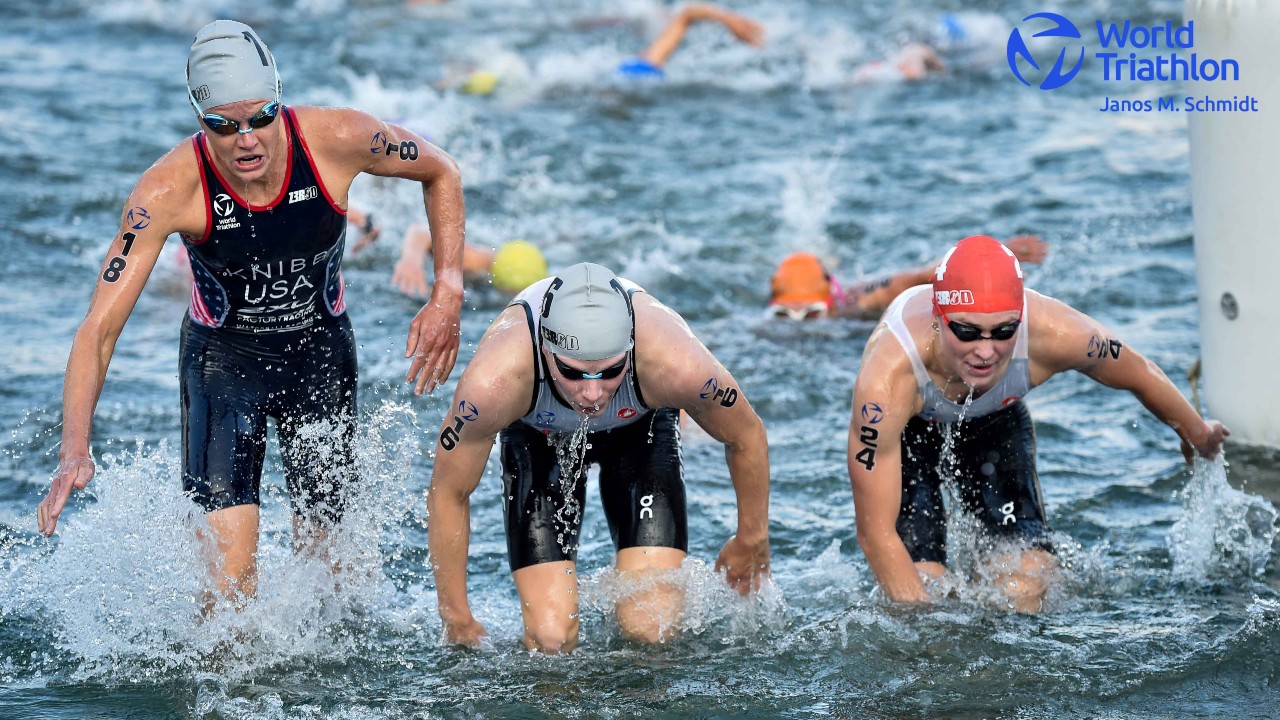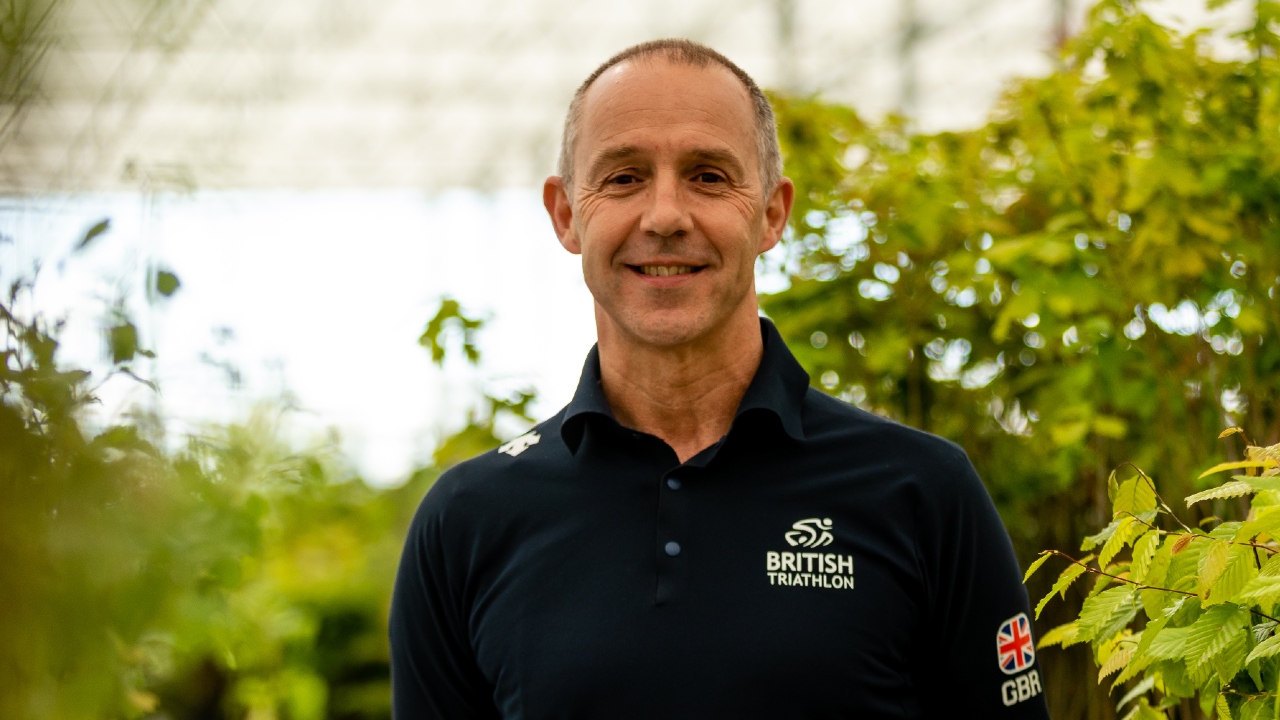After more than six years at the helm at British Triathlon, CEO Andy Salmon has this month left to take up the same position at Swim England.
And in an in-depth interview with TRI247 to discuss the highs and lows of his tenure – which included navigating the choppy waters of the global COVID pandemic – it was the open water swim aspect of triathlons which Salmon highlighted as potentially the biggest threat to the sport going forward.
He explained: “There’s the impact of global warming. What is that doing to water? So we saw that as a huge challenge in Tokyo [in 2021]. The water temperature in Tokyo was very close to the maximum permissible temperature. We can’t just stand by and accept that.
“Then you look at water quality and I think 2023, in my memory, was the worst season I can recall for races being affected by water quality.
“At the Paris Test event for the Olympics and Paralympics the individual races on the Olympic side went ahead as triathlons but then by the weekend, the water quality had deteriorated slightly and so the para racing and the Mixed Team Relay were duathlons.
“Now, they were still exciting races, but we cannot get to Paris this summer and see the race format being changed to duathlons.”
Salmon on WTCS Sunderland water quality
But what does Salmon think triathlon – and his new sole focus of swimming – can do to turn the tide?
He said: “I think there’s a need to engage with other water-based sports. And there’s a need to engage with government and government agencies and put our weight behind campaigns to stop water companies putting sewage into our waterways. That needs to be better regulated. They need to take more ownership of that issue.
“And I think we can also get better as a sport. Such as how we test water quality. We’ve started a piece of work at British Triathlon to find quicker, more cost-effective ways to test for the key undesirables in a piece of water before the athletes get in and swim, whether it’s for a training swim or whether it’s for a race itself. So I’d say that’s a big area of focus.”
When asked specifically about what happened at the WTCS event in Sunderland last year, Salmon insisted it’s the wider problem the sport should be prioritising, adding: “It would be stupid of me to try and pretend or suggest that there’s not a problem with water quality.
“You look at it globally, you look at what happened in Paris, you look at what happened in Madrid [when the European Championships became duathlons]. Those were clear cases of the water not being clean enough.
 Will the River Seine host swimming events at Paris 2024? (Photo – World Triathlon).
Will the River Seine host swimming events at Paris 2024? (Photo – World Triathlon).
“I don’t want to get defensive, but that wasn’t the case in Sunderland. That was, dare I say, terrible reporting by some aspects of the media based on what one elite athlete said, which was fundamentally wrong. But nevertheless, from time to time, our athletes are faced with swimming in water that isn’t clean.”
Higher up the agenda
And while there’s clearly a huge amount that needs doing, Salmon does see some reasons for optimism, adding: “I do feel like the whole environmental climate change lobby, from a global perspective, has made some progress in the last six to 12 months. I think people are taking it more seriously.
“Whether it’s electric cars on the road or the way people are more conscientious about recycling – I do think there’s a public demand for doing better.
“And while I don’t want to get into politics, with a UK election probably coming up later this year I suspect that the environment will be higher up the agenda than it has been in previous elections.
But let’s be realistic. British Triathlon working alone isn’t going to change people’s votes or change government policy.
“But if we collaborate with all the other water-based sports in the UK, which is what we’re doing, and we collectively go to government and say, this needs to be better and why, then we can make a difference.
“There’s the impact on the health of the nation – if people can get into a river, get into a lake, get into the sea and go for a swim, it doesn’t matter how good they are, how fast or how slow they are, if they can do that more then just imagine the positive impact that will have on the NHS.
“So there’s a real fundamental rationale for government to get behind this. So I’m optimistic that we can move the needle on this one. We have to.
“It’s unacceptable that we carry on the way things are going, not just speaking as a triathlete or swimmer. It has to be better for our kids and their kids.”
 Andy Salmon [Photo credit: British Triathlon]
Andy Salmon [Photo credit: British Triathlon]
Confidence behind Paris
Salmon promised he will be working with Ruth Daniels, his successor at British Triathlon, and others to “see how we can collaborate and bring pressure to bear on the relevant authorities to do better in this space.”
And he hopes that the water quality in Paris can be transformed into a good news story that potentially inspires other cities.
He signed off by saying: “And just coming back to Paris, I’m really confident that the Olympics and Paralympics will be triathlons.
“Because based on what I learned back in August of last year, there’s an incredible amount of money being spent on systems in Paris to avoid the contamination of the River Seine.
“The ambition for them isn’t just to have really great triathlon and marathon swimming events at the Olympic and Paralympic Games, but it’s for Parisians to be able to swim in the Seine year after year after year. So what a fantastic legacy that would be.
“And maybe then that might impact our government here in the UK and they might try and replicate that, which would be fantastic.”
>>> Read full article>>>
Copyright for syndicated content belongs to the linked Source : Tri247 – https://www.tri247.com/triathlon-news/elite/triathlon-water-quality-paris-2024-olympic-games-andy-salmon?utm_source=rss&utm_medium=rss&utm_campaign=triathlon-water-quality-paris-2024-olympic-games-andy-salmon










